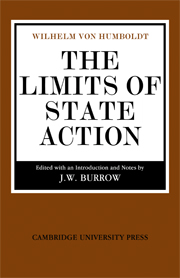Book contents
- Frontmatter
- Contents
- Editor's Introduction
- ON THE LIMITS OF STATE ACTION
- NOTE ON THIS EDITION AND TRANSLATION
- Contents
- CHAPTER I Introduction
- CHAPTER II Of the individual man, and the highest ends of his existence
- CHAPTER III On the solicitude of the State for the positive welfare of the citizen
- CHAPTER IV Of the solicitude of the State for the negative welfare of the citizen—For his security
- CHAPTER V On the solicitude of the State for security against foreign enemies
- CHAPTER VI On the solicitude of the State for the mutual security of the citizens—Means for attaining this end—Institutions for reforming the mind and character of the citizen—National education
- CHAPTER VII Religion
- CHAPTER VIII Amelioration of morals
- CHAPTER IX The solicitude of the State for security more accurately and positively defined—Further development of the idea of security
- CHAPTER X On the solicitude of the State for security with respect to actions which directly relate to the agent only (Police laws)
- CHAPTER XI On the solicitude of the State for security with respect to such of the citizens' actions as relate directly to others (Civil laws)
- CHAPTER XII On the solicitude of the State for security as manifested in the juridical decision of disputes among the citizens
- CHAPTER XIII On the solicitude for security as manifested in the punishment of transgressions of the State's laws (criminal laws)
- CHAPTER XIV On the care of the State for the welfare of minors, lunatics, and idiots
- CHAPTER XV Measures for the maintenance of the State—Completion of the theory
- CHAPTER XVI Practical application of the theory proposed
- Other works by Wilhelm von Humboldt
- Select Bibliography
- Index
- CAMBRIDGE STUDIES IN THE HISTORY AND THEORY OF POLITICS
CHAPTER X - On the solicitude of the State for security with respect to actions which directly relate to the agent only (Police laws)
from ON THE LIMITS OF STATE ACTION
Published online by Cambridge University Press: 05 February 2015
- Frontmatter
- Contents
- Editor's Introduction
- ON THE LIMITS OF STATE ACTION
- NOTE ON THIS EDITION AND TRANSLATION
- Contents
- CHAPTER I Introduction
- CHAPTER II Of the individual man, and the highest ends of his existence
- CHAPTER III On the solicitude of the State for the positive welfare of the citizen
- CHAPTER IV Of the solicitude of the State for the negative welfare of the citizen—For his security
- CHAPTER V On the solicitude of the State for security against foreign enemies
- CHAPTER VI On the solicitude of the State for the mutual security of the citizens—Means for attaining this end—Institutions for reforming the mind and character of the citizen—National education
- CHAPTER VII Religion
- CHAPTER VIII Amelioration of morals
- CHAPTER IX The solicitude of the State for security more accurately and positively defined—Further development of the idea of security
- CHAPTER X On the solicitude of the State for security with respect to actions which directly relate to the agent only (Police laws)
- CHAPTER XI On the solicitude of the State for security with respect to such of the citizens' actions as relate directly to others (Civil laws)
- CHAPTER XII On the solicitude of the State for security as manifested in the juridical decision of disputes among the citizens
- CHAPTER XIII On the solicitude for security as manifested in the punishment of transgressions of the State's laws (criminal laws)
- CHAPTER XIV On the care of the State for the welfare of minors, lunatics, and idiots
- CHAPTER XV Measures for the maintenance of the State—Completion of the theory
- CHAPTER XVI Practical application of the theory proposed
- Other works by Wilhelm von Humboldt
- Select Bibliography
- Index
- CAMBRIDGE STUDIES IN THE HISTORY AND THEORY OF POLITICS
Summary
In order to follow man, as we now must through all the complex and manifold relations which his life in society presents, it will be best to begin with considering the simplest of these, the case where man, though living in association with others, remains strictly within the limits of what belongs to himself, and engages in nothing that refers immediately to the rights of others. It is to this aspect of civil relations that the greater number of our so-called police, or preventive, laws are directed; since, however indefinite this expression may be, it still conveys to us the general and important idea, that these laws relate to the means of averting violations of the rights of others. Now they either restrict actions whose immediate consequences are likely to endanger the rights of others; or they impose limitations on those which usually lead ultimately to transgressions of the law; or, lastly, they may specify what is necessary for the preservation or exercise of the power of the State itself. I must here overlook the fact that those regulations which do not relate to security, but are directed to the positive welfare of the citizen, are most commonly classed under this heading; since it does not fall in with the system of classification I have adopted.
- Type
- Chapter
- Information
- The Limits of State Action , pp. 86 - 92Publisher: Cambridge University PressPrint publication year: 1969

